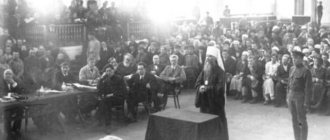Abbreviations adopted in church calendars
Personalities
The abbreviation of the plural of a term is usually formed from the abbreviation of the singular by doubling the last letter.
Example: St. - saint, sv. - the Saints.
|
|
|
Abbreviations adopted in church calendars[ | ]
Personalities[ | ]
The abbreviation of the plural of a term is usually formed from the abbreviation of the singular by doubling the last letter.
Example: St. - saint, sv. - the Saints.
|
|
|
Some abbreviations in English and Latin sources
This list is based on the article in The Original Catholic
)[2], from which only those abbreviations were selected that have
a relative
correspondence in the above dictionary. This list does not serve as an English-Russian dictionary and is provided here for reference purposes only and to ensure compatibility with the corresponding English Wikipedia article. The original subsection headings have been preserved and translated into Russian.
From the Apostolic Acts and Documents
- Fr.
– Frater (“en:Brother”) - Frum.
– Fratrum (“Of the Brothers”) - Pbr.
– Presbyter (“en:Priest”) - PP.
– Papa (“en:Pope”) - Pr.
– Pater (“en:Father”) - Venebli
– Venerabili (“en:Venerable”)
Commonly used in church vocabulary
|
|
|
From the inscriptions in the catacombs
- M.
– Martyr, or Memoria (“Memory”) or Monumentum (“Monument”) - MM.
– Martyres (“Martyrs”) - PRB.
– Presbyter (“Priest”)
Some abbreviations in English and Latin sources[ | ]
This list is based on the article in The Original Catholic Encyclopedia[2], from which only those abbreviations that have a relative
correspondence in the above dictionary. This list does not serve as an English-Russian dictionary and is provided here for reference purposes only and to ensure compatibility with the corresponding English Wikipedia article. The original subsection headings have been preserved and translated into Russian.
From the Apostolic Acts and Documents[ | ]
15th century manuscript in Latin using abbreviations
- Fr.
— Frater (“en:Brother”) - Frum.
— Fratrum (“Of the Brothers”) - Pbr.
— Presbyter (“en:Priest”) - PP.
— Papa (“en:Pope”) - Pr.
— Pater (“en:Father”) - Venebli
- Venerabili (“en:Venerable”)
Commonly used in church vocabulary[ | ]
|
|
|
From the inscriptions in the catacombs[ | ]
- M.
- Martyr, or Memoria (“Memory”) or Monumentum (“Monument”) - MM.
— Martyres (“Martyrs”) - PRB.
— Presbyter (“Priest”)
Excerpt characterizing Church abbreviations
– Remember that everything depends on this for you. At this time, the arrival of the minister with his son was not only known in the maiden's room, but the appearance of both of them was already described in detail. Princess Marya sat alone in her room and tried in vain to overcome her inner agitation. “Why did they write, why did Lisa tell me about this? After all, this cannot be! - she said to herself, looking in the mirror. - How do I get out into the living room? Even if I liked him, I couldn’t be on my own with him now.” The thought of her father's gaze terrified her. The little princess and m lle Bourienne had already received all the necessary information from the maid Masha about what a ruddy, black-browed handsome minister's son was, and about how daddy dragged them with force to the stairs, and he, like an eagle, walking three steps at a time, ran after him. Having received this information, the little princess and M lle Bourienne, still audible from the corridor in their animated voices, entered the princess’s room. – Ils sont arrives, Marieie, [They arrived, Marie,] do you know? - said the little princess, wobbling her belly and sitting heavily on the chair. She was no longer in the blouse in which she had sat in the morning, but she was wearing one of her best dresses; her head was carefully adorned, and there was a liveliness on her face, which, however, did not hide the drooping and deadened contours of her face. In the attire in which she usually wore to social gatherings in St. Petersburg, it was even more noticeable how much she had looked worse. M lle Bourienne also unnoticed some improvement in her outfit, which made her pretty, fresh face even more attractive. – Eh bien, et vous restez comme vous etes, chere princesse? – she spoke. – On va venir annoncer, que ces messieurs sont au salon; il faudra descendre, et vous ne faites pas un petit brin de toilette! [Well, are you still wearing what you were wearing, princess? Now they will come to say that they are out. We’ll have to go downstairs, but at least you’ll dress up a little!] The little princess got up from her chair, called the maid and hastily and cheerfully began to come up with an outfit for Princess Marya and put it into execution. Princess Marya felt insulted in her sense of self-worth by the fact that the arrival of her promised groom worried her, and she was even more insulted by the fact that both of her friends did not even imagine that it could be otherwise. To tell them how ashamed she was for herself and for them was to betray her anxiety; Moreover, to refuse the outfit that was offered to her would have led to lengthy jokes and insistence. She flushed, her beautiful eyes went out, her face became covered with spots, and with that ugly expression of victim that most often settled on her face, she surrendered to the power of m lle Bourienne and Lisa. Both women cared quite sincerely about making her beautiful. She was so bad that not one of them could think of competing with her; therefore, quite sincerely, with that naive and firm conviction of women that an outfit can make a face beautiful, they set about dressing her. “No, really, ma bonne amie, [my good friend], this dress is not good,” said Lisa, looking sideways at the princess from afar. - Tell me to serve, you have masaka there. Right! Well, this may be the fate of life is being decided. And this is too light, not good, no, not good! It was not the dress that was bad, but the face and the whole figure of the princess, but M lle Bourienne and the little princess did not feel this; It seemed to them that if they put a blue ribbon on their hair combed up, and pulled down a blue scarf from a brown dress, etc., then everything would be fine. They forgot that the frightened face and figure could not be changed, and therefore, no matter how they modified the frame and decoration of this face, the face itself remained pitiful and ugly. After two or three changes, to which Princess Marya obediently submitted, the minute she was combed up (a hairstyle that completely changed and spoiled her face), in a blue scarf and an elegant dress, the little princess walked around her a couple of times with her small hand she straightened a fold of her dress here, tugged at a scarf there and looked, bowing her head, now from this side, now from the other. “No, that’s impossible,” she said decisively, clasping her hands. – Non, Marie, decidement ca ne vous va pas. Je vous aime mieux dans votre petite robe grise de tous les jours. Non, de grace, faites cela pour moi. [No, Marie, this definitely does not suit you. I love you better in your gray everyday dress: please do this for me.] Katya,” she said to the maid, “bring the princess a gray dress, and see, m lle Bourienne, how I will arrange it,” she said with a smile of artistic anticipation joy. But when Katya brought the required dress, Princess Marya sat motionless in front of the mirror, looking at her face, and in the mirror she saw that there were tears in her eyes and that her mouth was trembling, preparing to sob. “Voyons, chere princesse,” said M lle Bourienne, “encore un petit effort.” [Well, princess, just a little more effort.]
Combining and shortening prayers
Question No. 273: “We are in Moscow, and I am worried about some of our brothers who, living here for six months or even a year, shorten and combine prayers. Is there any reason for this?
https://s3.eu-west-2.amazonaws.com/abu.islam.ue/qa/vopros273.mp3
_
Praise be to Allah, the Lord of the worlds, peace and blessings be upon our beloved Messenger, his family and companions, as well as those who followed his path until the Day of Judgment.
Praise be to Allah, the Lord of the worlds, peace and blessings be upon our beloved Messenger ﷺ, his family and his companions, as well as those who followed his path until the Day of Judgment.
A similar issue has already been discussed earlier, but once again we will briefly repeat what is connected with it. Any journey that is not sinful allows a person to combine prayers and shorten them. However, what is a journey? According to most scientists, travel is a person’s departure from his place of residence with the intention of traveling more than four miles [1]. A barid is an Arabic measure of length common during the time of the Prophet ﷺ, and if we convert this distance into kilometers, then four barids will be about eighty-nine kilometers; some authors say about eighty-five or eighty-three.
In any case, taking into account all disagreements, this path should not be less than eighty kilometers. Anyone who leaves his home with the intention of making this journey becomes a traveler as soon as he leaves his locality, no matter how many kilometers he has moved from it, and accordingly, he already has the right to shorten and combine prayers, as well as eat food, if he is fasting.
There are three main opinions regarding when these rights cease to apply to him.
First opinion. Some scholars have said that once a person has reached or reached the point he intended to visit, his journey ends and he no longer has the right to combine or shorten his prayers and break his fast.
Second opinion [2] . Some scholars said that if a person is going to stay there for less than four days, then he has the right to shorten and combine prayers and not fast.
Third opinion [3] . A person has the right to all the benefits of a traveler if he intends to stay at the place of arrival for no more than fifteen days. Otherwise, from the first day he performs prayer like the inhabitants of this area.
Which of these opinions is stronger? There is no doubt that when the opinion of the majority of scientists comes to you, then you should pay more attention to it than the others, because when the majority of scientists choose one opinion, it is valid.
Of the three mentioned opinions, the majority opinion is the second, it was held by three out of four imams - if a person intends to stay at the place of arrival for less than four days, then he has the right to shorten and combine prayers and not fast, and if more, then relief for the traveler , they do not apply to him and from the first day of his arrival he performs prayers without combining or shortening. The argument of the supporters of this opinion is the hadith cited by Imams al-Bukhari and Muslim, that when the Prophet ﷺ arrived in Mecca, he said: “Muhajir remains in Mecca for three days after the completion of his pilgrimage ”[4]. This hadith clearly indicates that it is prohibited for a muhajir who has migrated from Mecca to stay in it for more than three days, since after this period he is no longer a traveler, but is like someone who has settled there and lives. Therefore, most scholars have deduced from this hadith that a person is considered a traveler if he stays in a place for four days, and if more than that, then he is no longer a traveler and from the first day begins to pray as usual.
The first opinion was held by 'Aisha, Taus and some other salafs, may Allah be pleased with them.
The third opinion is the opinion of one of the imams and it is valid. However, how to explain this if the majority opinion is the second opinion? The evidence for the third opinion is the well-known fact that in some of his travels and ghazats, the Prophet ﷺ was in one place for fifteen days and he combined and shortened prayers[5]. Scientists explain it this way: if a person arrives in a certain area and does not intend to stay there, what is called “sitting on his suitcases” and can leave this place at any moment, he continues to be a traveler. He does not rent an apartment there for six months, does not buy food for a month, he is in this place for some business and can leave at any moment. This was the case with the Prophet ﷺ, who went out on a campaign, and circumstances were such that he stayed in one place, and while he was there, he combined and shortened his prayers. This was the case with Ibn 'Umar, may Allah be pleased with him, who was in Azerbaijan and for six months combined and shortened his prayers - and this is reliably known[6]. Why did he combine and shorten prayers for six months? Because he had no intention of staying there, he was waiting for the opportunity to leave there at any moment.
If a person cannot leave, waiting for the decision of some matter, some news, or some documents that are about to be handed over; if he is stuck due to weather conditions or enemies have surrounded him - that is, circumstances have developed in a certain way and a person is delayed in some place, but he does not and did not have the intention of staying there for more than four days - no matter how long this person remains in In this state, even for six months, even for a year, he is a traveler. Regarding this, even the unanimous opinion of scientists is conveyed[7].
The same people who go to work, to study, to visit relatives, and they know that they will stay in this place for more than four days, are not travelers from the moment of arrival in this place and, accordingly, do not have any rights as a traveler and They cannot combine or shorten prayers.
All these details must be distinguished and taken into account. I hope this is clear.
And Allah knows best.
Abu Islam al-Sharqasi Riyadh, Saudi Arabia 10 Sha'ban 1441 (04/03/2020)
[1] As an argument, they cite a hadith from Ibn Abbas, which is reported by ad-Daraqutni (see al-Sunan, vol. 1, p. 387) as well as al-Bayhaqi (vol. 3, pp. 137-138). As a hadith, this tradition is not reliable for two reasons. Firstly, the transmission of Ismail ibn 'Ayyash other than from the inhabitants of Sham is weak. Secondly, 'Abdul-Wahhab in Mujahid is a weak transmitter. But this is authentic from Ibn 'Abbas and from Ibn 'Umar, as reported by "mu'allaqan" by al-Bukhari in Sahih (see Fath al-Bari of Ibn Hajar, vol. 2, p. 565), as well as al-Bahakhi with an authentic isnad (vol. 3, p. 137) and Ibn Abi Shayb (see Musannaf, vol. 2, p. 445).
[2] This is the opinion of the majority of scholars: the Malikis (see Mawahib al-Jalil al-Khattab, vol. 2, p. 503), the Shafiites (see Rawdah al-Talibin al-Nawawi, vol. 1, p. 384; and also Mughni al-Mukhtaj ash-Shirbini, vol. 1, p. 264), one of the opinions of Ahmad (see al-Mughni Ibn Qudamy, vol. 2, p. 212; and also Majmu' al-Fatawa Ibn Taymiyya, t . 24, p. 17), and also it was chosen by at-Tabari (see at-Tamhid Ibn 'Abd al-Barra, vol. 11, p. 181) and some of the salaf: 'Uthman ibn Affan and Tabiyin Sa'id Ibn al-Musayib (see al-Howi al-Kabir al-Mawardi, vol. 2, p. 371).
[3] This is the opinion of the Hanafis and also of Sufyan al-Thawri (see Sunan at-Tirmidhi, vol. 1, p. 550).
[4] Sahih al-Bukhari , hadith from al-'Ala ibn al-Hadrami under number 3933; Sahih Muslim , Hadith No. 1352.
[5] Sahih al-Bukhari , hadith from Ibn Abbad under number 4298
[6] Sunan al-Kubra al-Bayhaqi, vol. 6, p. 174. The isnad of this legend was considered reliable by an-Nawawi (see Khulyasa al-Ahkam, vol. 2, p. 734)
[7] The unanimous opinion (ijma') is conveyed by: at-Tirmidhi (see Sunan at-Tirmidhi, vol. 2, p. 434), Ibn 'Abd al-Barr (see al-Istizkar, vol. 2, p. 242) and Ibn Rushd (see Bidayah al-Mujtahid, vol. 1, p. 170).










